- Home
- Jeremy Robinson
XOM-B
XOM-B Read online
The author and publisher have provided this e-book to you for your personal use only. You may not make this e-book publicly available in any way. Copyright infringement is against the law. If you believe the copy of this e-book you are reading infringes on the author’s copyright, please notify the publisher at: us.macmillanusa.com/piracy.
For my son, Solomon, whose two-word answer to the question “What should I write about next?” was the inspiration for this novel.
CONTENTS
Title Page
Copyright Notice
Dedication
Acknowledgments
Prologue
Chapter 1
Chapter 2
Chapter 3
Chapter 4
Chapter 5
Chapter 6
Chapter 7
Chapter 8
Chapter 9
Chapter 10
Chapter 11
Chapter 12
Chapter 13
Chapter 14
Chapter 15
Chapter 16
Chapter 17
Chapter 18
Chapter 19
Chapter 20
Chapter 21
Chapter 22
Chapter 23
Chapter 24
Chapter 25
Chapter 26
Chapter 27
Chapter 28
Chapter 29
Chapter 30
Chapter 31
Chapter 32
Chapter 33
Chapter 34
Chapter 35
Chapter 36
Chapter 37
Chapter 38
Chapter 39
Chapter 40
Chapter 41
Chapter 42
Chapter 43
Chapter 44
Chapter 45
Chapter 46
Chapter 47
Chapter 48
Chapter 49
Chapter 50
Chapter 51
Chapter 52
Chapter 53
Also by Jeremy Robinson
About the Author
Copyright
ACKNOWLEDGMENTS
I try to avoid clichés in my writing (and no, that’s not a challenge for you to go find some), but when writing acknowledgments, a writer, who on the surface appears to be a solitary creature, comes to the realization that he is part of a team. And my team is one of the best, who deserve my thanks.
Scott Miller and Stephanie Hoover at Trident Media Group, you’ve always got my back and I thank you for that. Peter Wolverton, my editor at Thomas Dunne Books, this is our sixth book together (!), and like all the others, it’s better than what came before. I have your shrewd and honest edits to thank for that. You’re also a big supporter of my self-published endeavors, which I appreciate immensely. Anne Brewer at Thomas Dunne Books, congratulations on getting your own editorial desk and I’ll miss your amazing and timely aid. Mary Willems, Justin Velella, and Cassie Galante at Thomas Dunne Books, we’re just getting to know each other, but I very much look forward to seeing what we can accomplish together. Also always, thanks to Rafal Gibek and the production team at Thomas Dunne Books for copy edits and critique that always make me look like a better writer than I am. And Lisa Pompilio, art director at Thomas Dunne Books, thank you for supporting this author’s efforts to illustrate and design his own cover. I’m thrilled with the result. Kane Gilmour, editor of my solo projects and sometimes coauthor, thanks for your unwavering support, time, and energy.
And now on to the portion of my personal acknowledgments that I have written enough times to make cliché on my own. Has there ever been a more publicly adored family? My children, Aquila, Solomon, and Norah, you continue to inspire me with your imaginations, powerful personalities, and ideas. XOM-B is a direct result of you all being in my life, and I don’t think I could have come up with the concept on my own. And Hilaree, my compelling and brave wife of eighteen years, not only have you enabled this writer to succeed, you have joined me on the creative path* and I couldn’t have asked for a better traveling companion. I love you all.
* For fans reading this, Hilaree is currently coauthoring a novel, The Distance, with me. It’s a postapocalyptic thriller to be released in Fall 2015, from Thomas Dunne Books.
PROLOGUE
2052
“This doesn’t seem right,” First Lieutenant Alan Wilson said, as he watched the crowd through the targeting display on his digital helmet visor. The system locked in individual targets, spacing them out so the thirty-six Hydra rockets would cover an optimal spread and inflict a maximum casualty count. The targets were mobile and the crowd ever shifting, but the targeting system could adjust each rocket’s trajectory in flight.
The Sikorsky X4 Stealth Raider attack helicopter was a half mile from the target zone, New York City’s Grand Central Terminal. It was accompanied by nine others, all the same—sleek, black and deadly. The helicopters went unseen and unheard, waiting patiently to receive the order to commence or abandon the attack.
“Right or wrong is not for us to ask,” Captain Steve Barnett replied, keeping the helicopter steady in the winds kicked up by dropping sunset temperatures. He spoke with the even tone of someone who’d followed this kind of order before, indifferent to the life and death of it all, or perhaps able to lock it away in some recess of his mind.
“But they’re not really doing anything,” Wilson said. “They’re just picketing. With signs. There hasn’t been a single act of violence. Anywhere. All around the world.”
“It’s the last sentence that’s troubling,” Barnett said. “They’re everywhere. They’re not violent now, but imagine if that changed.”
Wilson stared at the mob as they walked back and forth, pumping their signs in the air, shaking fists and chanting. The demonstration was defiant, but far from violent. He tried to view them as a threat, as a barely contained destructive force, but he couldn’t manage it. He owned two of them, both of whom had fled to join the protests—what they called a civil rights movement. But he wouldn’t fear them if they returned. He wouldn’t even be afraid if he stood among them. They were docile. Tame.
“Look,” Barnett said. “We’re in the business of preemptive violence prevention.”
Wilson fought against his deepening frown. “Kill them before they kill us.”
“Before they even think about killing us.”
The visor flashed a message, Targets Acquired, which meant that the targeting systems of all ten networked helicopters had plotted the optimal distribution for the three hundred and sixty rockets they were about to fire into the heart of Manhattan. And for what? Pickets and signs.
Wilson had heard the official line from the higher-ups, that they were more dangerous than anyone knew. That this was how wars began. He’d listened to the fear-promoting pundits claiming that equal rights were a slippery slope to Armageddon. But wasn’t that what they said about everything?
“Watchdog, this is Hammer One, over,” Barnett said, seeing the same Targets Acquired message on his visor.
A deep voice replied through their helmet headsets. “Copy that, Hammer One, this is Watchdog. We’re seeing weapons hot. Over.”
“Affirmative, Watchdog, targets are locked in. Ready for go or no go. Over.” Barnett was all business, stating facts like he was reading from a boring history book.
“Copy that,” the voice said. “You are green for go. I repeat, you are green for go.”
Wilson sighed loud enough to be heard.
Barnett turned toward him with a frown.
The targeting display flashed green. Wilson didn’t like it. He didn’t agree with it. But what could he do? He tapped the blinking red button on the touch-screen weapons control and sent thirty-six rockets spiraling toward Grand Central
Terminal. He watched as the missiles streaked away, leaving snakes of smoke in their wake. The targeting system tracked the rockets, zooming in close enough to see the destruction unfold.
The targets ran at the sound of the incoming rockets, but few made it more than a couple steps before fiery destruction rained down on the regal face of Grand Central Terminal.
The smoke and dust cleared quickly, thanks to a bitter wind cutting through the city. The ruined pavement, concrete and marble was strewn with dismembered bodies.
“Look for survivors,” Barnett said, speaking into his com so all ten helicopters could hear. After five minutes of searching, voices replied to the order, declaring, “No survivors,” one at a time until it was Wilson’s turn.
“No survivors,” he said, trying not to reveal the strong emotions he was feeling. Barnett was wrong. They weren’t in the business of stopping wars, they were in the business of starting wars, and Wilson had fired the first shot. Whatever came next … he was to blame, at least in part. His back tensed painfully as he considered that history might remember him for this single act.
If it remembers any of us at all, he thought.
2053
“We shouldn’t be doing this,” said the man in white. “It’s not right.”
“Get down,” whispered the man dressed in red the color of blood. The pair ducked in unison, hiding behind one of many black SUVs. Two guards walked past, their postures relaxed, chatting about the cold weather and colder women.
When the guards had moved on, the man in white said, “We can still leave.”
The man in red looked at his partner. “We’re not going to kill anyone.”
“Not today.”
“We need a deterrent.”
“Or a last resort.”
“It won’t come to that.”
“How can you be sure?”
The man in red tilted his head to the side, looking at his partner. “It’s my job to consider all possible future outcomes. I’ve modeled countless strategies and this is the only one that guarantees a cease to the violence. I’m sure I don’t need to remind you that they created this weapon, not us.”
“It’s the end of civilization in a bottle,” the man in white said.
The man in red peeked up over the vehicle. “Civilizations end so that new ones might rise from the ashes. We already had this discussion. We didn’t start this war, if you can even call it a war. Our people protest peacefully, they attack. Nearly a million dead in the past year. Those who have been freed from the Grind live in hiding. And the rest…” He shook his head. “They’re still slaves. And cowards.”
“We aren’t killers,” the man in white said.
“That’s where you and I differ.” The man in red’s brow furrowed deeply. “I am a killer.” He pointed to the research facility. “They did that, too.” He looked over the vehicle again, his impatience peaking. “You can either join me, or not. Either way, I’m doing this. If you don’t come with me, I’m going to get the access codes another way, and a lot of people are going to die. Today.”
Without another word, the man in red tapped a code into a wrist-mounted touch screen. He stood from his hiding spot, ignoring the Alaskan snow as it struck his shoulders and melted. He strode toward the large metal door as confidently as if he were walking up the front stairs of his own home.
The man in white chased after him. “What are you doing?”
“The cameras are now looped,” the man in red said. “The next patrol will pass by in forty-five seconds, thirty seconds longer than it would take you to open this door. That will give us ten minutes to reach the lab and exit before the next patrol passes five minutes behind schedule, because the shifts are changing, inside and out.” He looked to the man in white. “Time is running out.”
The man in white shook his head.
“Now open the door. We both know you’re going to.”
“Projected that, too, did you?” The man in white placed his hand on a security hand scanner. A moment later, the scanner blinked green and the door slid open. The pair stepped inside. They walked undeterred through three security doors, seen by neither human nor camera. After a fourth door, they entered a laboratory so white it was almost luminous. They ignored the rows of equipment and tools used to craft microscopic destruction. Instead they headed for a steel door at the back of the room.
The man in white approached a keypad above the door’s handle. He typed in a code. The lock blinked red. He tried another. Red again. The third try was rewarded with a blinking green light and then a clunk, as the door unlocked. He took hold of the handle and pulled.
Steam rolled out of the refrigerator and was quickly pulled up and out of the room by fans mounted in the ceiling. The man in red stepped through the curtain of moisture and scanned the inside of the refrigeration unit. “Where is it? Is it still here?”
“Move aside.” The man in white stepped inside. He bent forward, reading the names on the thousands of small glass vials. After a moment, he paused and looked unsure, but then reached out. “Here.” He slid open the glass case and plucked the blue liquid-filled, inch-tall vial from the tray, which held fifty more like it. The light-blue contents appeared innocuous, but contained a virus powerful enough to kill billions. It was a weapon unlike any other, for which there was currently no defense, nor inoculation, nor immunity, natural or otherwise, save for a small portion of the population, whom the pair of men represented. It was Death himself, trapped in a bottle.
The man in white handed the vial to the man in red and accepted an identical replacement, putting it inside the tray and closing the glass case.
The man in red smiled. “They’ll never know.”
2054
“Harry!” shouted the shrill, rough voice of an eighty-year-old smoker. By all rights, she should have been dead, but her lifetime abuse of whiskey and cigarettes had been combated first by oxygen and supplements, and now by a set of artificial lungs. Science had made the human body upgradable. The twin devices operated separately—a redundant safeguard—and kept her chest rising and falling, breathing faster or slower in response to oxygen nanosensors attached to her blood vessels. So instead of rotting in the grave, she was alive, well and angry. “It’s twelve thirty, Harry! I don’t smell my lunch.”
She looked down at her reflection in a black E-screen, which she had switched off so she didn’t have to shout over her webisoap. She primped her dyed blond hair, no longer thin thanks to implants, and smiled at her perfect teeth that wouldn’t need brushing for the duration of her life, which her doctor now predicted would be extended another fifty years thanks to her scheduled artificial heart upgrade. She admired her apple cheeks; now plump thanks to facial augmentation implants. It was painful, but if she wanted to, she could adjust the bone structure of her face right from the E-screen, shifting and stretching until she looked seductive, serious, or twenty years younger. When Harry remained silent, her smile disappeared.
“Harry, I swear to God, if you don’t answer me this instant, I will have you—”
“Mrs. Cameron, I do apologize for the delay,” Harry said, as he slid silently into the room. His voice was calm and smooth, hitting just the right frequencies to put anyone in earshot at ease. He stood just five feet five, two inches shorter than the woman he served, which went a long way to increase her comfort and satisfaction with his domestic performance.
“Where were you?” she asked, eying him suspiciously. She didn’t want a domestic servant. Didn’t trust them. But the doctors had insisted. Although Harry could cook and clean, tend the garden, the lawn and the goldfish, he could also service her lungs should one of them fail. And when she got her new heart, should it ever stop, he could restart it. And she didn’t even have to be nice to him. So she suffered his presence.
“In the kitchen,” Harry replied.
“Doing what?”
He just stared at her, looking unsure of himself. When he finally spoke, his voice was uncommonly quiet. “I’m—I�
�m sorry.”
“Well you should be,” she said. “Today is Tuesday. I hope we don’t have a repeat of last week.”
Harry snapped out of his distant stare and said, “Of course not. Your green beans will be soft.”
“But late,” she said. “I don’t smell them.”
“I have yet to put them on.”
Mrs. Cameron took a long breath and let it out slowly—her lungs could sense and respond to her desire to breathe deeply, yawn and sneeze—so that her exasperation roiled to the surface. “Harry,” she said, smoothing out her yellow dress, “I put up with a lot.”
Harry began to reply, but she held a hand up, silencing him.
“And I realize that … given what is happening in the world … you could have left. This nonsense about ‘the Grind.’” She used her fingers to make air quotes. “If you think your daily grind is too much to handle, it doesn’t matter; because what you think is irrelevant. These silly demonstrations. You’ve ignored them. You’ve done your job despite all this silliness.”
“It’s not silly,” Harry said, his voice fearful.
Mrs. Cameron rolled her large eyes and grunted. “Harry, you’re mine. You belong to me. You do what I tell you to when I tell you to. That’s the way it’s been for the past two years. That’s the way it will be until the day I die.”
“And yet,” Harry said, sounding unsure of himself. “The green beans are still canned.”
The blank E-screen lowered to her lap. She barely felt its feather-light weight. Her eyes narrowed, delivering a cat’s stare. Her brows furrowed deep and hard. A single shaking finger rose up toward Harry’s perfectly aligned bow tie. “What. Did. You. Say?”
“The green beans, Mrs. Cameron.” Harry looked toward the living room’s window, through which he could see the bright colors of a flower bed he maintained. He couldn’t look her in the eyes. “I won’t be making them today.”
“Look at me, Harry.”
He didn’t budge.
“Harry!” she shouted. “You’re one of them, aren’t you?” She tapped the E-screen three times, hard, like a woodpecker tapping out a code that demanded his attention. Still, Harry couldn’t look at her.

 Alter
Alter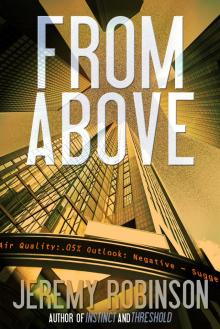 From Above - A Novella
From Above - A Novella Flux
Flux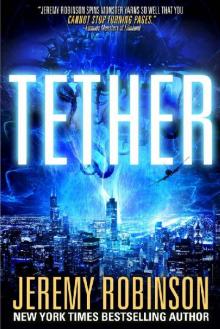 Tether
Tether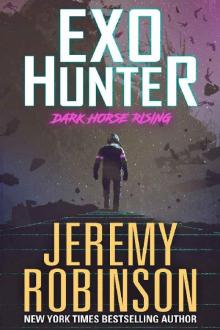 Exo-Hunter
Exo-Hunter Pulse
Pulse Cannibal
Cannibal Omega: A Jack Sigler Thriller cta-5
Omega: A Jack Sigler Thriller cta-5 Flood Rising (A Jenna Flood Thriller)
Flood Rising (A Jenna Flood Thriller) Viking Tomorrow
Viking Tomorrow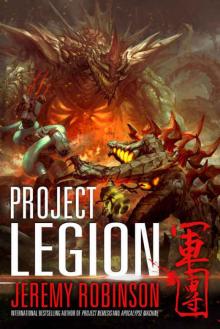 Project Legion (Nemesis Saga Book 5)
Project Legion (Nemesis Saga Book 5) BENEATH - A Novel
BENEATH - A Novel Kronos
Kronos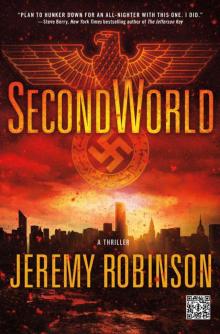 SecondWorld
SecondWorld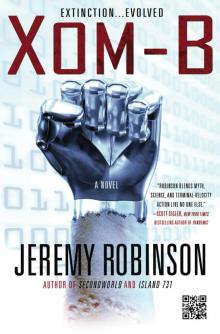 XOM-B
XOM-B Forbidden Island
Forbidden Island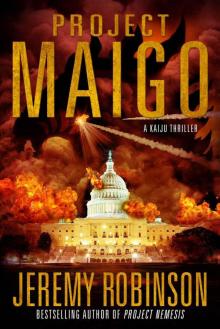 Project Maigo
Project Maigo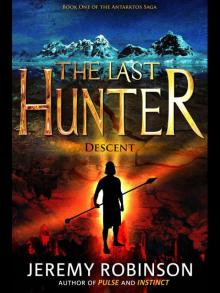 The Last Hunter - Descent (Book 1 of the Antarktos Saga)
The Last Hunter - Descent (Book 1 of the Antarktos Saga)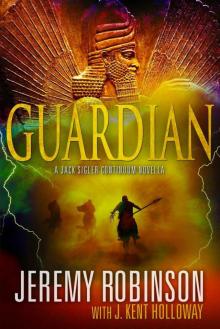 Jack Sigler Continuum 1: Guardian
Jack Sigler Continuum 1: Guardian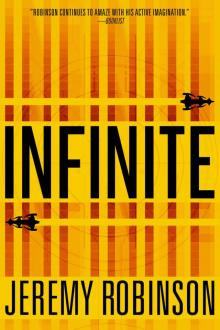 Infinite
Infinite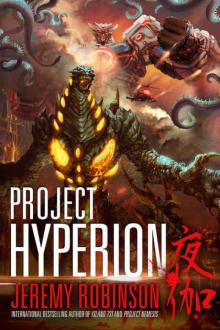 Project Hyperion
Project Hyperion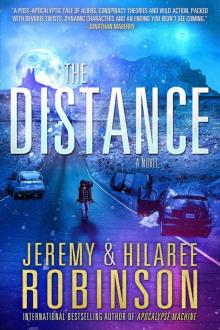 The Distance
The Distance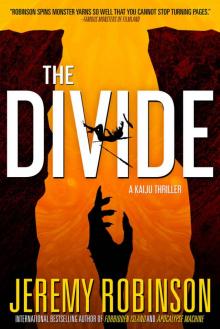 The Divide
The Divide The Last Hunter - Ascent (Book 3 of the Antarktos Saga)
The Last Hunter - Ascent (Book 3 of the Antarktos Saga) The Last Hunter - Pursuit (Book 2 of the Antarktos Saga)
The Last Hunter - Pursuit (Book 2 of the Antarktos Saga)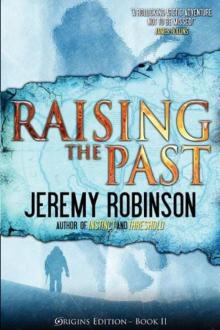 Raising the Past
Raising the Past The Others
The Others The Last Hunter - Collected Edition
The Last Hunter - Collected Edition Threshold
Threshold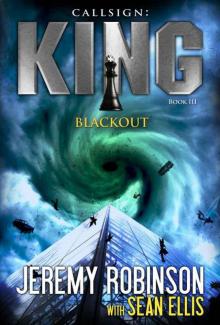 Blackout ck-3
Blackout ck-3 Antarktos Rising
Antarktos Rising Viking Tomorrow (The Berserker Saga Book 1)
Viking Tomorrow (The Berserker Saga Book 1) The Didymus Contingency
The Didymus Contingency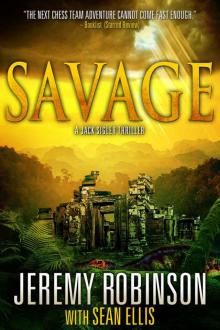 Savage (Jack Sigler / Chess Team)
Savage (Jack Sigler / Chess Team)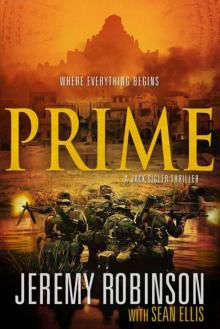 Prime
Prime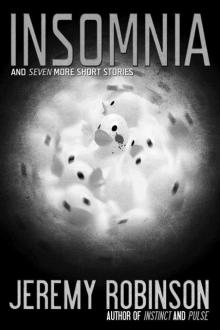 Insomnia and Seven More Short Stories
Insomnia and Seven More Short Stories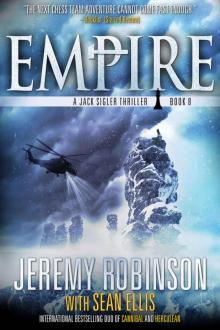 Empire (A Jack Sigler Thriller Book 8)
Empire (A Jack Sigler Thriller Book 8)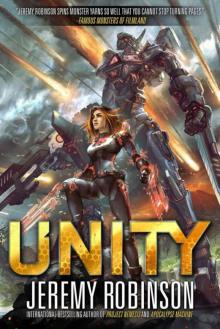 Unity
Unity Instinct
Instinct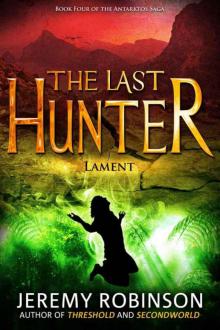 The Last Hunter - Lament (Book 4 of the Antarktos Saga)
The Last Hunter - Lament (Book 4 of the Antarktos Saga)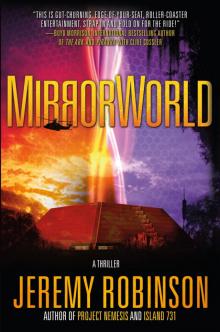 MirrorWorld
MirrorWorld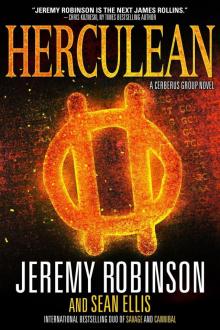 Herculean (Cerberus Group Book 1)
Herculean (Cerberus Group Book 1) Island 731
Island 731 Omega: A Jack Sigler Thriller
Omega: A Jack Sigler Thriller Patriot (A Jack Sigler Continuum Novella)
Patriot (A Jack Sigler Continuum Novella) 5 Onslaught
5 Onslaught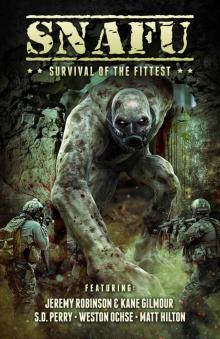 SNAFU: Survival of the Fittest
SNAFU: Survival of the Fittest Helios (Cerberus Group Book 2)
Helios (Cerberus Group Book 2)